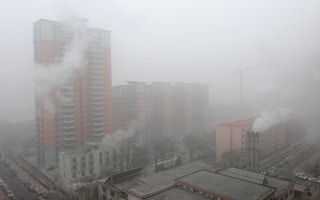China is to “declare war” on pollution, Premier Li Keqiang said on Wednesday at the opening of the annual meeting of parliament, with the government unveiling detailed measures to tackle what has become a hot-button social issue.
It is not uncommon for air pollution in parts of China to breach levels considered by some experts to be hazardous. That has drawn much public ire and is a worry for the government, which fears any discontent that might compromise stability.
“We will resolutely declare war against pollution as we declared war against poverty,” Li told the almost 3,000 delegates to the country’s largely rubber-stamp legislature in a wide-ranging address carried live on state television.
Curbing pollution has become a key part of efforts to upgrade the economy, shift the focus away from heavy industry and tackle the perennial problem of overcapacity, with Li describing smog as “nature’s red-light warning against inefficient and blind development”.
“This is an acknowledgement at the highest level that there is a crisis,” said Craig Hart, expert on Chinese environmental policy and associate professor at China’s Renmin University.
“
We will resolutely declare war against pollution as we declared war against poverty
China’s Premier Li Keqiang
“Their approach is going to have to be pro-economy. I think they will pump money into upgrading plants. This could be another green stimulus although it is not being packaged that way.”
China has published a series of policies and plans aimed at addressing environmental problems but it has long struggled to bring big polluting industries and growth-obsessed local governments to heel.
Li said efforts would focus first on reducing hazardous particulate matter known as PM 2.5 and PM 10 and would also be aimed at eliminating outdated energy producers and industrial plants, the source of much air pollution.
China will cut outdated steel production capacity by a total of 27 million tonnes this year, slash cement production by 42 million tonnes, and also shut down 50,000 small coal-fired furnaces across the country, Li said.
The 27 million tonnes of steel, equivalent to Italy’s production capacity, amounts to less than 2.5 per cent of China’s total, and industry officials have warned that plants with another 30 million tonnes of annual output went into construction last year.
The targeted cement closures amount to less than 2 per cent of last year’s total production.
The battle against pollution will also be waged via reforms in energy pricing to boost non-fossil fuel power. Li promised change in “the way energy is consumed and produced” through the development of nuclear and renewables, the deployment of smart power transmission grids, and the promotion of green and low-carbon technology.
The National Development and Reform Commission (NDRC), the country’s economic planner, said in its report that new guidelines would be issued on relocating key industries away from urban centers to help tackle smog.
Not just smog
China does not just suffer from smog, which has once again this winter enveloped large parts of the heavily populated east, and will this year also aim to tackle severe water and soil pollution.
The NDRC said it would also take action this year to tackle agricultural pollution, including the contamination of farmland by heavy metals, with 3.33 million hectares (8 million acres) believed to be too polluted to grow crops.
Last month, the government said it would spend 2 trillion yuan ($330 billion) on tackling pollution of scarce water resources.
Li said China would also aim to convert 333,300 hectares of marginal farmland to forest and grassland and would continue to fight desertification and recover wetlands.
The NDRC said China would seek to ensure that polluters pay by establishing a new mechanism to compensate victims of environmental damage and by holding local officials accountable.
Parliament is also mulling amendments to environmental protection legislation that will grant new powers to fine and punish offenders.
In a separate report on Wednesday, the Ministry of Finance said China would spend 21.1 billion yuan on energy conservation and environmental protection in 2014, up 7.1 percent on 2013. It said 64.9 billion yuan would be allocated to agriculture, forestry and water conservation, up 8.6 percent.










